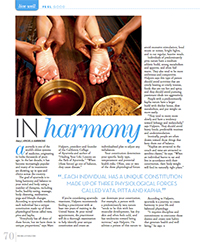 Ayurveda is the one of the world’s oldest systems of medicine, originating in India more than 5,000 years ago. In the last decade, it has become increasingly popular, and many of its treatments are showing up in spas and clinics across the country.
Ayurveda is the one of the world’s oldest systems of medicine, originating in India more than 5,000 years ago. In the last decade, it has become increasingly popular, and many of its treatments are showing up in spas and clinics across the country.
The goal of Ayurveda is to bring harmony and balance to your mind and body using a number of therapies, including herbs, healthy eating, massage, body cleansing, meditation, yoga and lifestyle changes.
According to Ayurvedic medicine, each individual has a unique constitution, which is made up of three physiological forces called Vata, Pitta and Kapha. “Everybody has all three of these forces, but we have them in unique proportions,” says Dr. Marc Halpern, president and founder of the California College of Ayurveda and author of Healing Your Life: Lessons on the Path of Ayurveda. “When (these forces) go out of balance, they cause disease.”
If you’re considering Ayurvedic treatment, Halpern recommends finding a practitioner with at least two years of training in the United States. At your initial appointment, the practitioner will do a thorough examination to help identify your unique constitution and create an individualized plan to adjust any imbalances.
Your constitution determines your specific body type, temperament and potential health risks. Often one or two of the three physiological forces can dominate your constitution. For example, a person with a predominantly Vata nature “tends to be thin with less muscular development, has dry skin and often feels cold, and has tendencies toward being nervous,” says Halpern. He advises a person of this nature to avoid excessive stimulation, loud music or noises, bright lights and to eat regular, heavier meals.
Individuals of predominantly Pitta nature have a medium athletic build, strong metabolism and appetite, and often feel warm. They also tend to be more ambitious and competitive. Halpern says this type of person should avoid activities that are overly heating or overly intense, foods that are too hot and spicy, and avoid pursing passionate ideals too aggressively.
People with a predominantly Kapha nature have a larger build with thicker bones, slow metabolism and put weight on more easily. “They tend to move more slowly and have a tendency toward lethargy and melancholy,” says Halpern. They should avoid heavy foods, predictable routines and understimulation.
Ironically, people are often drawn toward those things that keep them out of balance. “Kaphas are attracted to the couch and Vatas are attracted to aerobics classes,” says Halpern. “When an individual learns to eat and live in accordance with their constitution, their body weight will find its naturally right place.”
According to Halpern, Ayurveda is a journey to create harmony in your life and balanced physiology. “It requires discipline and commitment to overcome those desires and create new habits that generate health and well being.”